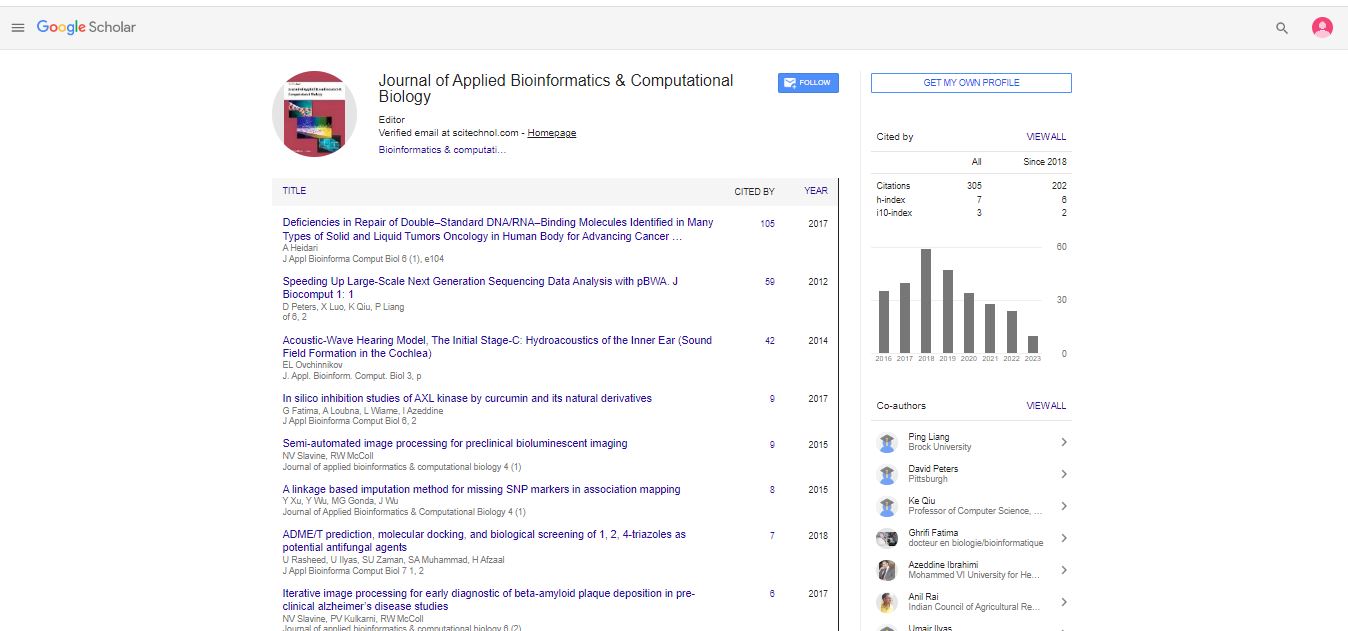Opinion Article, J Appl Bioinforma Comput Biol Vol: 12 Issue: 1
Computational Biology: Unleashing the Power of Data
Rita Sternberg*
Department of Life Sciences, Imperial College London, London, UK
*Corresponding Author: Rita Sternberg
Department of Life Sciences, Imperial
College London, London, UK
E-mail: sternberg@gmail.com
Received date: 18 January, 2023, Manuscript No. JABCB-23-96639;
Editor assigned date: 20 January, 2023, PreQC No. JABCB-23-96639 (PQ);
Reviewed date: 03 February, 2023, QC No. JABCB-23-96639;
Revised date: 10 February, 2023, Manuscript No. JABCB-23-96639 (R);
Published date: 17 February, 2023, DOI: 10.4172/2329-9533.1000255
Citation: Sternberg R (2023) Computational Biology: Unleashing the Power of Data. J Appl Bioinforma Comput Biol 12:1.
Description
Computational biology is a rapidly growing field that merges computer science and biology to improve our understanding of biological systems and processes. It has revolutionized the way scientists approach biological research and has opened up new avenues for discovery. One of the major advantages of computational biology is the ability to analyze vast amounts of data. With the explosion of genetic sequencing and other omics technologies, biologists are now able to gather more data than ever before. However, this also means that there is an huge amount of data that needs to be analyzed, and traditional experimental methods are simply not feasible. Computational biology provides the necessary tools and algorithms to analyze this data and extract meaningful insights.
Another key aspect of computational biology is simulation. With the aid of powerful computer models, scientists can now simulate complex biological systems and processes, such as protein folding and gene regulation. This allows researchers to make predictions about the behavior of these systems and test their hypotheses without the need for time-consuming and expensive experimental studies.
Computational biology also plays an important role in drug discovery . By using computer models to simulate the interactions between drugs and biological targets, scientists can quickly identify potential drug candidates and test their efficacy before proceeding with more expensive and time-consuming experimental studies.
Despite its many benefits, computational biology is not without its challenges. One major challenge is the need for specialized knowledge and skills in both computer science and biology. In addition, there is still a lack of standardization in the field, which can make it difficult to compare results from different studies and make it difficult for researchers to collaborate.
Computational biology is a vital tool in modern biological research that has revolutionized the way we approach biological systems and processes. It has opened up new avenues for discovery and has the potential to make a significant impact in the fields of medicine, agriculture, and biotechnology. However, to fully realize its potential, the field must continue to evolve and overcome the challenges it faces.
Applications of computational biology
Computational biology has a wide range of applications in various areas of life sciences, including genomics, proteomics, systems biology, drug discovery, and personalized medicine. Here are some examples:
Genomics: Computational biology plays an important role in DNA sequences, identifying genes, predicting their functions, and understanding their regulation. It has revolutionized our ability to study the human genome and other species, leading to significant breakthroughs in genetics, evolutionary biology, and personalized genomics.
Proteomics: Computational methods are used to analyze and interpret large-scale data generated by mass spectrometry, which is used to study proteins and their functions. It helps in understanding protein-protein interactions, post-translational modifications, and protein structures, which are critical for drug discovery and targeted therapies.
Systems biology: Computational biology facilitates the integration of data from multiple sources, such as genomics, proteomics, and metabolomics, to model and simulate biological systems at a systems level. It enables the study of complex biological networks, such as signaling pathways, metabolic pathways, and gene regulatory networks, to gain insights into their dynamics and behavior.
Drug discovery: Computational biology accelerates the process of drug discovery by using algorithms to screen and design potential drug candidates. It helps in identifying drug targets, predicting drug toxicity, and optimizing drug properties, leading to more efficient and cost-effective drug development pipelines.
Personalized medicine: Computational biology enables the analysis of patient-specific data, such as genomic data, clinical data, and electronic health records, to develop personalized treatment plans. It helps in predicting disease risk, optimizing treatment strategies, and improving patient outcomes.
 Spanish
Spanish  Chinese
Chinese  Russian
Russian  German
German  French
French  Japanese
Japanese  Portuguese
Portuguese  Hindi
Hindi 
